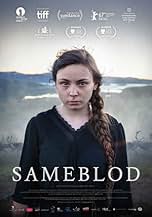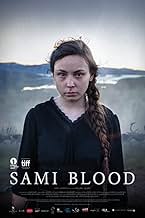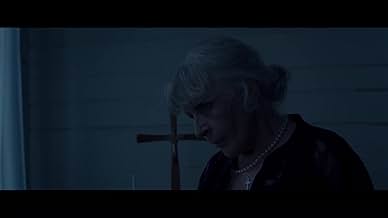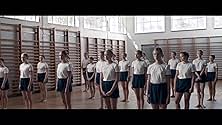Une jeune fille sami qui élève des rennes et qui est exposée au racisme des années 1930 dans son pensionnat commence à rêver d'une autre vie. Mais pour y parvenir, elle doit devenir quelqu'u... Tout lireUne jeune fille sami qui élève des rennes et qui est exposée au racisme des années 1930 dans son pensionnat commence à rêver d'une autre vie. Mais pour y parvenir, elle doit devenir quelqu'un d'autre et rompre tout lien avec sa famille et sa culture.Une jeune fille sami qui élève des rennes et qui est exposée au racisme des années 1930 dans son pensionnat commence à rêver d'une autre vie. Mais pour y parvenir, elle doit devenir quelqu'un d'autre et rompre tout lien avec sa famille et sa culture.
- Réalisation
- Scénario
- Casting principal
- Récompenses
- 26 victoires et 18 nominations au total
- Elle Marja
- (as Maj Doris Rimpi)
- …
Avis à la une
I believe that one of the factors that makes this film interesting is the way it explores the subject, in this case, xenophobia and racism, in a country considered by many to be an almost perfect example of modern societies, Sweden.
The story begins with Elle Marja, as a retired teacher, at her sister's funeral, and then takes us into a flashback, where both are young and start attending school.
The process of abandoning culture, the dialect and the mannerisms and gestures themselves is explored in a good way, it fits the time when the individual shapes his personality (adolescence), which allows us to perceive the attitudes that the character adopts throughout the story development.
The photography is very interesting, with that atmosphere of melancholy and loneliness typical of northern European films.
Shot by cinematographers Sophia Olsson and Petrus Sjövik, the film is set in Sweden in the 1930s when the rising tide of nationalist fervor dominated Europe and led to the Nazi's embrace of Eugenics and the theory of the master race. Sami Blood opens in the present day, however, as ninety-year-old Christina (Maj Doris Rimpi) returns to Lapland with her son and granddaughter to attend the funeral of her estranged sister. Traditional yoik-singing does not prevent Christina from becoming morose and withdrawn, retreating to a hotel by herself. The film then flashes back eighty years to the time when Christina (Lene Cecilia Sparrok), then known as Elle-Marja, was a precocious 14-year-old girl living with her sister Njenna (Sparrok's own sister Mia Erika) and her recently widowed mother (Katarina Blind), engaged in reindeer herding.
As in the US and Canada where Native children were sent to residential schools where their language, religion and cultural beliefs were often the object of ridicule, the sisters are sent to a special boarding school where they learn the hard lesson that the world regards them as lesser human beings. The Sami girls are dismissed by local Swedish teens as "circus animals" and "filthy Lapps," and are subject at school to being measured and photographed to prove a physical basis for their inferiority. While singled out for her learning ability by her deceptively supportive teacher, Christina (Hanna Alstrom, "Kingsman: The Secret Service"), Elle-Marja's inquiries about becoming a teacher meets with the reply that Sami's have small brains and are not capable of functioning outside of their own community. "Studies have shown that your people can't get by in town you have to stay here or you'll die out," she says.
In spite of her humiliation, Elle-Marja is able to dream of a more productive future. It is a future, however, that will cause her to turn her back on her family and her heritage, a betrayal that will mark her entire life. In one scene, Elle Marja, who is trying to pass herself off as a "normal Swede," blurts out to her sister, "Get away, you filthy Lapp." When she meets Niklas (Julius Fleischlanderl, "Young Sophie Bell") a good-looking Swedish boy from Uppsala who does not know that she is Sami, her dreams of escaping from the school begin to become real. After her mother refuses to sell a reindeer in order to pay for the education Elle-Marja requires to become a teacher, she changes her name to Christina and pursues her relationship with Niklas.
Showing up at his upscale home, Christina untruthfully tells his mother that Niklas said that she could stay with them. In spite of their growing connection which includes staying overnight in his room, he does not defend her when his mother discovers her to be a Sami and she is asked to leave. She remains determined, however, to start a new life regardless of the barriers she faces. Though Sami Blood covers familiar ground, the pain caused by discrimination can never be routine. What elevates the film to a different level, however, is the quiet but fiercely determined performance of Lena Cecilia Sparrok as Elle-Marja/Christina. While the film is about oppression, it is not a polemic but a human document that transcends the limitations of its environment and makes a universal statement about the longing to fit in, the fear of isolation, and the conflict between the life we are born into and the one we choose for ourselves.
Le saviez-vous
- AnecdotesAll the Sámi characters are played by real life Sámi people.
- Citations
Elle Marja: [to Njenna] Don't yoik at school...
- ConnexionsEdited from Stoerre Vaerie (2015)
Meilleurs choix
- How long is Sami Blood?Alimenté par Alexa
Détails
- Date de sortie
- Pays d’origine
- Sites officiels
- Langues
- Aussi connu sous le nom de
- Sami Blood
- Sociétés de production
- Voir plus de crédits d'entreprise sur IMDbPro
Box-office
- Montant brut mondial
- 442 416 $US
- Durée1 heure 50 minutes
- Couleur
- Rapport de forme
- 2.35 : 1
Contribuer à cette page
























